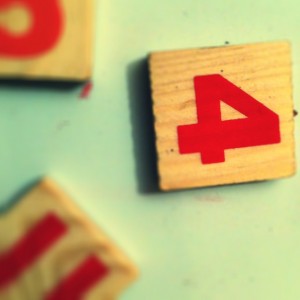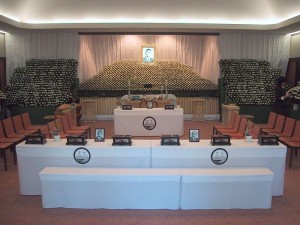Superstitions about numbers are nothing new. Look at Western culture’s obsession with the unlucky number thirteen to understand how pervasive number superstitions can be.
Many people in Japan would think nothing of hopping into an elevator to get to the thirteenth floor, but if they get a gift of four wine glasses for a birthday, they might break into a nervous sweat. That’s because the number four is a symbol of death in Japan.
When Japanese people speak about the number four, it sounds like they are also speaking about death.
The origins of this superstition can be blamed on the way we speak. In the Japanese language, the number four is pronounced “shi,” which is the same way the word for “death” is pronounced. When Japanese people speak about the number four, it sounds like they are also speaking about death.
People go as far as to avoid giving gifts in packages of four or scheduling important events on April 4th, which is considered one of the unluckiest days of the year. People in Japan sometimes also consider Friday the 13th unlucky, although this is due to Western influence. Despite the number thirteen gaining fear in Japan, the number four still reigns supreme in horror novels.
A common practice in Japan is to remove or add items to a gift if it comes in fours, making the gift a set of three or five instead. The superstition also applies to funeral service dates.
According to Rokuyo, a version of the Japanese calendar that supposedly tells people when their luckiest and unluckiest days will be, the ideal day to schedule a funeral service is on Butsumetsu. On this day, people who have died are said to be most at-rest. The unluckiest day for a memorial service is on Tomobiki.
Tomobiki occurs on the second and eighth day of the lunar month. The word literally translates to “pulling a friend,” which is why it is so unlucky for funerals, according to superstition. The word sounds as if a friend is going to be pulled into the next life with a loved one who has died.
People will often make another smaller coffin for the funeral, placing a doll inside. The doll is used to distract spiritual entities from taking a living human being along with them.
Japanese superstition dictates that funerals scheduled on a Tomobiki day must take steps to prevent a premature kidnapping into the next life. People will often make another smaller coffin for the funeral, placing a doll inside. The doll is used to distract spiritual entities from taking a living human being along with them.
While not everyone in Japan follows this superstition, many hospitals and office buildings still refuse to label the fourth floor. You will also rarely see weddings planned for April 4th.
Superstitions have a long multicultural history of providing a safety blanket to the aspects of life people feel as though they can’t control. It gives them power in a chaotic world.
Superstitions evolve across cultures from a fear of the unknown. Death is often unpredictable, and for some it can even be terrifying. The Japanese cultural tradition of avoiding the number four is Japanese society’s way of coping with the idea of death. Superstitions have a long multicultural history of providing a safety blanket to the aspects of life people feel as though they can’t control. It gives them power in a chaotic world.
Just as Japanese society has its own set of superstitions, Western culture is also well-acquainted with the idea. Do you have any superstitions you swear by in your own life?
For more information on Japanese death and burial traditions, click here.

 Japanese Funeral Superstitions Surrounding Death and the Number Four
Japanese Funeral Superstitions Surrounding Death and the Number Four




 Recovering Cremation Remains After the Los Angeles Fires
Recovering Cremation Remains After the Los Angeles Fires
 “As Tears Go By” by Marianne Faithfull
“As Tears Go By” by Marianne Faithfull
 “The Sea” by John Banville
“The Sea” by John Banville














